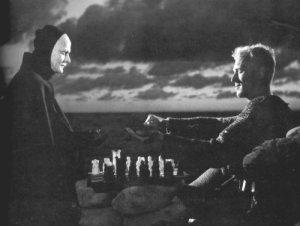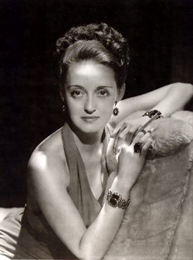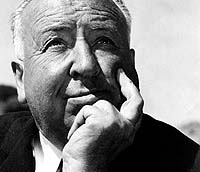You
could tell that Dick Cavett was nervous. And Ingmar Bergman, being
Bergman, didn’t miss the opportunity to point out that The
Seventh Veil was a bad movie, unlike his own, The Seventh
Seal.
Cavett
had traveled all the way to Sweden to do their 1971 interview on
a  borrowed
set. Yet, as the lights came up and Cavett turned to the camera,
it was impossible to tell that Cavett was anywhere other than in
his signature habitat of quiet urbanity. borrowed
set. Yet, as the lights came up and Cavett turned to the camera,
it was impossible to tell that Cavett was anywhere other than in
his signature habitat of quiet urbanity.
Turner
Classic Movies has been showcasing Cavett’s legendary interviews
with some of film’s greatest stars and directors, culled from
his late-night ABC series that aired weeknights from December 1969-December
1972. For those three years, Johnny Carson blew Cavett out of the
water but it didn’t matter. Carson was a different animal
performing different tricks. Carson’s show, even though
it appeared at 11:30, reeked of its late afternoon origins. Carson’s
job was to re-assure America that all was well before lights out.
Cavett belonged to that hour when a particularly engaging dinner
party is just breaking up and there’s always one straggler
who insists on a last drink. You move to a couple of chairs
in the den, some low light bleeding in from another room. Kenneth
Tynan remarked that Cavett creates the illusion that he is your
guest, enjoying a slightly subversive private chat.
You could never
imagine Cavett allowing John and Yoko to guest host a week of his
shows, as Mike Douglas did. Cavett’s sense of midnight intimacy
and candor was unique on television, then and now. The sixties opened
up the clock, pushing the mind deeper into the hours during which
Ward Cleaver’s America slept. There was no reason to turn
in at ten unless you were Nixon.
If,
as Nick Tosches suggests, Dean Martin was the consummate fifties
man sticking it to the sixties, Cavett’s show worked the troubled
synapse between the sixties and the seventies like no other program.
After the horrors of Vietnam and the broken promises of
the Summer of Love, people were looking for a place to soothe their
tired souls, changed in ways they had yet to understand.
 When
Bettie Davis shows up for a chat, it’s the same wrinkled,
kooky free spirit we saw in Whatever Happened To Baby Jane.
She’s wearing go-go boots, she’s smoking, she’s
winking, she’s carrying on. And Dick’s loving it, hanging
back, letting her do her thing. Midway through the interview, Davis
reminisces about her fight to get out her studio contract and become
a free agent. She won, eventually. Davis beams with pride, an event
emblematic of her forceful Yankee personality in action. Cavett
quietly goes on greasing the rails for her ride onto the next story
about necking with screen-test lotharios. When
Bettie Davis shows up for a chat, it’s the same wrinkled,
kooky free spirit we saw in Whatever Happened To Baby Jane.
She’s wearing go-go boots, she’s smoking, she’s
winking, she’s carrying on. And Dick’s loving it, hanging
back, letting her do her thing. Midway through the interview, Davis
reminisces about her fight to get out her studio contract and become
a free agent. She won, eventually. Davis beams with pride, an event
emblematic of her forceful Yankee personality in action. Cavett
quietly goes on greasing the rails for her ride onto the next story
about necking with screen-test lotharios.
Watching
Davis you realize the stars of the silver screen were no longer
distant, twinkling lights. Television brought them up close and
soiled them with the mud cast by mere celebrities. Cavett, with
his self-effacing sophistication that permeated every aspect of
the show – the set, the lighting, the music, the tempo - offers
Hollywood’s greats a chance to soup-up their aura a bit. If
Cavett’s show has an undercurrent of melancholy to it, where
does that come from? Aging legends like Groucho Marx, holding court
as he waves a giant cigar? Or the audience that pines for them at
their apex of beauty and talent?
Cavett,
raised in Nebraska but educated at Yale, is often maligned as some
sort of East Coast fuddy-duddy. That assessment is not only unfair
but inaccurate. Orson Welles appeared on Cavett’s
show a record six times and they have a lot of fun. Welles, like
Cavett, was from the heartland. He, like Cavett, left the middle
West for bigger things. Yet as you watch them chat, you can feel
the warmth of “flyover territory” radiating from them
both.
Bergman
quips to Cavett that when he first saw Cavett do a monologue, he
didn’t like him. But as he towers over Cavett in his chair,
you can see that the great Swede is very much at ease. He offers
very touching (and somewhat troubling) anecdotes from his youth,
when he was “a dreamer”. Anyone who has read Bergman’s
autobiography, The Magic Lantern, knows all these stories.
Yet swaddled in the warmth of Cavett’s ambience, Bergman is
once again in the flesh a wounded, gifted child looking to escape
the unhappiness of family life in the fantasies of cinema.
Even
Hitchcock, the legendary cold fish who loathed actors, lets himself
be the moon to Cavett’s sun, reflecting out into the audience
and the camera. He tells a great story about playing around with
a reaction shot in the infamous step sequence from Eisenstein’s
Battleship Potemkin. Instead of an old woman  getting
bayoneted, Hitchcock and his editor inserted a shot of a teddy bear.
Sure enough, the reaction shot of a man’s face changed completely.
Hitchcock tells the story clearly to point out his power as a director
to control the audience’s emotions. But Cavett has him in
such good cheer, that Hitchcock comes off less as a manipulative
tyrant than a grown-up kid bemused at discovering something he’s
very good at. getting
bayoneted, Hitchcock and his editor inserted a shot of a teddy bear.
Sure enough, the reaction shot of a man’s face changed completely.
Hitchcock tells the story clearly to point out his power as a director
to control the audience’s emotions. But Cavett has him in
such good cheer, that Hitchcock comes off less as a manipulative
tyrant than a grown-up kid bemused at discovering something he’s
very good at.
--
Timothy Dugdale
Timothy Dugdale teaches in the Department of English at the
University of Detroit Mercy.
|






